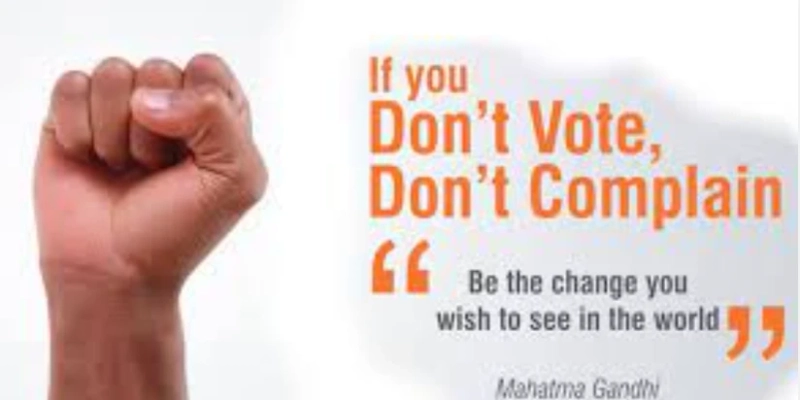India, with its rich tapestry of diversity and vibrant democracy, is at a crucial juncture in shaping the future of its elections. As we navigate the complexities of a dynamic political landscape, the call to action resonates: How will you, as a change-maker, contribute to the evolution of Indian elections?
1. Understanding the Landscape:
Before delving into your role as a change-maker, it's imperative to grasp the current state of Indian elections. India, as the world's largest democracy, witnesses a diverse array of political ideologies, regional dynamics, and demographic variations. While the democratic spirit is robust, there are challenges such as voter awareness, political transparency, and the need for continuous electoral reforms.
2. The Power of Individual Engagement:
As a change-maker, recognize the immense power that lies in individual engagement. It starts with staying informed – understanding the electoral process, policies, and the significance of active citizenship. Engage in open dialogues with fellow citizens, fostering an environment where diverse perspectives can be shared and debated.
3. Promoting Voter Education:
Change-makers play a pivotal role in promoting voter education. Take it upon yourself to spread awareness about the importance of voting, electoral rights, and the impact each vote can have. Leverage social media, community workshops, and other platforms to educate citizens on making informed choices, transcending traditional political narratives.
4. Community-Led Initiatives:
Real change often stems from the grassroots. Organize or participate in community-led initiatives that address local electoral challenges. These could include voter registration drives, town hall meetings, or workshops focusing on civic responsibilities. By fostering community engagement, you contribute to a more informed and active electorate.
5. Advocating for Electoral Reforms:
Be a voice for change by advocating for electoral reforms. Stay informed about current laws and policies, and actively participate in discussions surrounding reform proposals. Your advocacy could range from pushing for more transparent funding of political campaigns to supporting the use of technology for a smoother electoral process.
6. Leveraging Technology for Transparency:
In the digital age, technology is a potent tool for change. As a change-maker, explore ways to leverage technology for enhancing transparency in elections. This might involve supporting initiatives for online voter registration, advocating for secure electronic voting methods, or promoting the use of blockchain for ensuring the integrity of the electoral process.
7. Encouraging Inclusivity:
The strength of democracy lies in its inclusivity. Advocate for inclusivity within the electoral process by supporting initiatives that ensure the representation of diverse voices. Encourage participation from marginalized communities, women, and the youth. Inclusivity fosters a more comprehensive and representative democracy.
8. Collaborating with NGOs and Civil Society:
Join hands with non-governmental organizations (NGOs) and civil society groups working towards electoral integrity. These organizations often serve as watchdogs, monitoring elections, and advocating for fair practices. Your collaboration with such groups amplifies your impact, contributing to a collective effort for positive change.
9. Political Awareness Campaigns:
Engage in or support political awareness campaigns that aim to educate the public on critical issues, party agendas, and candidate profiles. By fostering an informed electorate, you contribute to a political landscape where decisions are based on substance rather than rhetoric.
10. Inspiring Youth Participation:
The youth are the torchbearers of change. Encourage and empower the younger generation to actively participate in the electoral process. Initiate mentorship programs, organize youth forums, and provide platforms for them to voice their concerns and aspirations. A politically engaged youth is a catalyst for transformative change.
11. Building Alliances for Reform:
Collaborate with like-minded individuals and organizations that share your vision for electoral reform. Building alliances amplifies your impact, creating a collective force that can influence policy changes and ensure a more transparent and accountable electoral system.
12. Staying Resilient in the Face of Challenges:
Change-making is a journey fraught with challenges. Whether it's navigating bureaucratic hurdles or facing resistance to reform, resilience is key. Stay committed to the cause, learn from setbacks, and adapt your strategies to overcome obstacles on the path to electoral improvement.
Conclusion:
In the grand tapestry of India's democracy, you, as a change-maker, hold a brush that can paint a future of transparent, inclusive, and participatory elections. The evolution of Indian elections rests not just with policymakers but with individuals committed to fostering positive change. By understanding the landscape, engaging communities, advocating for reforms, and leveraging technology, you contribute to a democratic India that reflects the aspirations and voices of its diverse populace. The question remains: How will you shape the future of Indian elections? The answer lies in your actions, your advocacy, and your unwavering commitment to a stronger, more vibrant democracy.



